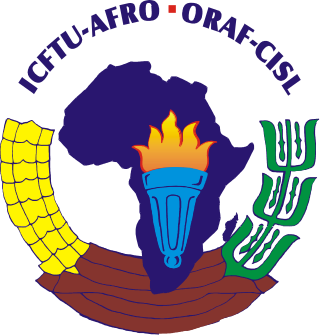
The International Confederation of Free Trade Unions (ICFTU) was an international trade union. It came into being on 7 December 1949 following a split within the World Federation of Trade Unions (WFTU), and was dissolved on 31 October 2006 when it merged with the World Confederation of Labour (WCL) to form the International Trade Union Confederation (ITUC).

The World Confederation of Labour (WCL) was an international labour organization founded in 1920 and based in Europe. Fascist governments of the 1930s repressed the federation and imprisoned many of its leaders, limiting operations until the end of World War II. In 2006 it became part of the International Trade Union Confederation (ITUC), ending its existence as an independent organization.
The ITUC Regional Organisation for Asia and Pacific is a regional organisation of the International Trade Union Confederation representing trade unions from countries in Asia and Oceania. It has 40 affiliated organisations in 28 countries, claiming a membership of 30 million people.

The ITUC Regional Organisation for Africa (ITUC-Africa) is a regional organisation of the International Trade Union Confederation, representing trade unions from countries in Africa. There are 56 national trade union federations affiliated to ITUC-Africa, from 45 countries, and representing a total of 15 million workers.

Sharan Leslie Burrow was the general secretary of the International Trade Union Confederation (ITUC) (2010-2022) and a former president of the Australian Council of Trade Unions (ACTU) (2000–2010). She was the first woman to become General Secretary of the ITUC since its foundation in 2006, and was the second woman to become President of the ACTU.

Decent work is employment that "respects the fundamental rights of the human person as well as the rights of workers in terms of conditions of work safety and remuneration. ... respect for the physical and mental integrity of the worker in the exercise of their employment."
The General Federation of Workers Trade Unions in Bahrain(Formerly known as the General Committee for Bahrain Workers) (GFWTUB) is a national trade union federation in Bahrain. It was established in 2002, by the Workers Trade Union Law granting workers the right to organize collectively.
There are few trade unions in Oman, established following a 2006 Decree by the Sultan of Oman permitting their organization. Some of these, have done completed elections, they are members of the General Federation of Oman Trade Union (GFOTU). Oman has become the third Gulf Arab state, after Bahrain and Kuwait, to have a general federation of trade unions.

Guy Bernard Ryder is a British international civil servant who currently serves as Under-Secretary-General for Policy at the United Nations.
Trade unions in Benin operate in relative freedom, with approximately 75% of the formal sector being unionized. There are, however, concerns expressed by the International Labour Organization (ILO) and the International Trade Union Confederation (ITUC) about the discrepancies between the government's Labour Code and the labour practices outlined by ILO Conventions 87 and 98 - specifically the right of unions to form without government approval, the right of seafarers to organize or strike, and restrictions on strikes.
Trade unions in Botswana operate within a longstanding democratic system in which the government of Botswana has ratified the International Labour Organization's core conventions, including Conventions 87 and 98.

The ICFTU African Regional Organisation (AFRO) was a regional organisation of the International Confederation of Free Trade Unions (ICFTU), representing trade unions from countries in Africa.

The ICFTU Asia and Pacific Regional Organisation (APRO) was a regional organisation of the International Confederation of Free Trade Unions (ICFTU), representing trade unions from countries in Asia and Oceania.

The ICFTU Inter American Regional Organisation of Workers was the regional organization of the International Confederation of Free Trade Unions (ICFTU) for the Americas.

Ramjee Kunwar is a Nepal Trade Union Congress-Independent (NTUCI) leader, Senior Vice President of NTUCI and executive member of Nepali Congress Party. He was also the former vice president and secretary of NTUCI and is currently acting president.
Heribert Maier was an Austrian trade union leader.
José Olivio Miranda Oliveira, often known as Zé Olívio, was a Brazilian trade unionist.
The Global Rights Index is a world-wide assessment of trade union and human rights by country. Updated annually in a report issued by the International Trade Union Confederation, the index rates countries on a scale from 1 (best) through to 5+ (worst). Ratings are based on 97 indicators derived from the labour standards of the International Labour Organization. The annual index reports on violations of trade union rights, such as limitations on collective bargaining and the right to strike, inhibiting trade union membership, state surveillance, violence and killings against trade unionists and restrictions on freedom of speech.













